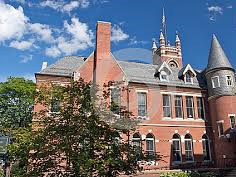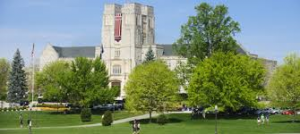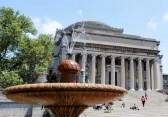 At the end of last week, the U. S. Department of Education announced that its Office for Civil Rights (“OCR”) had entered into a Resolution Agreement with the State University of New York (“SUNY”) dealing with Title IX compliance issues. Significantly, the Agreement arose out of an OCR initiated investigation and was not based on the filing of any complaint against SUNY. OCR’s Resolution Agreement and accompanying letter of findings are significant because, as with OCR’s Resolution Agreement earlier this year involving the University of Montana, they provide a roadmap as to what OCR considers to be the requirements of Title IX in the sexual harassment context. OCR’s latest pronouncements start with its basic operating premises:
At the end of last week, the U. S. Department of Education announced that its Office for Civil Rights (“OCR”) had entered into a Resolution Agreement with the State University of New York (“SUNY”) dealing with Title IX compliance issues. Significantly, the Agreement arose out of an OCR initiated investigation and was not based on the filing of any complaint against SUNY. OCR’s Resolution Agreement and accompanying letter of findings are significant because, as with OCR’s Resolution Agreement earlier this year involving the University of Montana, they provide a roadmap as to what OCR considers to be the requirements of Title IX in the sexual harassment context. OCR’s latest pronouncements start with its basic operating premises:
- if a recipient of federal financial assistance knows or has reason to know about sexual harassment which creates a hostile environment, it must take immediate action to eliminate it, prevent its recurrence and address its effects;
- when responding to any complaint of sexual harassment, a recipient must take immediate and appropriate action to investigate or otherwise determine what occurred;
- if that investigation reveals that discriminatory harassment occurred, the recipient must take prompt and effective steps reasonably calculated to end the harassment, eliminate any hostile environment and its effects, and prevent recurrence;
- these duties exist regardless of whether a student has complained, asked the recipient to take action, or identified the harassment as a form of discrimination.
From there, these documents offer important insight into OCR’s perspective of the full scope of a recipient’s obligations under Title IX. First, of course, the institution must have a policy expressly providing that it does not discriminate on the basis of sex in its educational programs or activities, that this prohibition extends to employment, and that inquiries concerning the application of Title IX may be referred to the institution’s Title IX Coordinator or to OCR. The Title IX Coordinator should be clearly identified by name or title, with contact information (phone number, address, email). Notice of this policy must appear, at a minimum, in announcements, bulletins, catalogs and application forms used in connection with the recruitment of students and employees and should be published broadly including on the institution’s website. Notice of the institution’s non-discrimination policy must also be provided to any unions representing the institution’s employees. Second, the institution must maintain procedures for resolving sexual harassment complaints. These procedures can be either the same as those used for resolving other types of complaints or can be dedicated to the resolution of sexual harassment complaints, but in either event they must provide for the prompt and equitable resolution of complaints, whether brought by students, employees or third parties. As in the University of Montana agreement, this Resolution Agreement and letter of findings set forth OCR’s view of what should be included in these policies:
- an appropriate definition of sexual harassment and examples of harassing conduct;
- clear notice of where complaints may be filed, including the name or title, phone, address and email information of those individuals;
- notice that students, employees and third parties may access these procedures (based on information we have received in other instances from OCR, we do not believe that OCR requires that the same procedure must apply to all three categories);
- designated and reasonable prompt timeframes for major steps of the grievance/complaint process;
- notice of the availability of interim measures to assist the complainant and the nature of those measures (such as the availability of counseling and academic assistance, steps that can be taken if the alleged perpetrator lives on campus and/or attends classes with the victim, etc.). Pending the outcome of the investigation, a recipient must take steps to protect the complainant from further harassment, and must ensure that such interim measures will not disproportionately impact the complainant;
- notice of a complainant’s Title IX rights and any available resources, such as counseling services and their right to file a complaint with local law enforcement;
- in the event the policy provides for informal resolution procedures (such as mediation) the policy it cannot require a complainant to work the matter out directly with an alleged perpetrator, the complainant must know that he or she can end informal resolution at any time, and if the allegations include sexual assault/violence, mediation is not appropriate even on a voluntary basis (as was the case in OCR’s 2011 “Dear Colleague Letter,” OCR’s letter of findings refers to mediation as one example of informal procedures that may be available, but then provides only that mediation is not appropriate in cases of sexual assault/violence; presumably other informal procedures may be);
- any hearing processes must be equally available to both parties, including the opportunity to present relevant witnesses and other evidence and if an appeal process is provided (based on the Resolution Agreement, it appears that OCR does not require an appeal procedure), it must be available to both the complainant and the respondent;
- written notice to the parties of the outcome of the proceedings, including any appeals (if appeals are provided for);
- assurances that the institution will take steps to prevent further harassment and to correct its discriminatory effects on complainant if appropriate;
- protections against retaliation, including ensuring that complainants know how to report any subsequent problems (and the institution should follow up with complainants to determine whether any retaliation or new incidents of harassment have occurred);
- assurances of confidentiality to the extent possible, but even if the complainant requests confidentiality or asks that a complaint not be pursued, an institution must nonetheless take all reasonable steps to investigate and respond consistent with that request for confidentiality or request not to pursue an investigation (although OCR has given little guidance explaining how an institution is to strike that balance appropriately);
- if the incident involves potential criminal conduct, the recipient must determine consistent with state and local law whether law enforcement should be notified (but it should not wait - more than temporarily - for law enforcement to carry out its responsibilities).
In addition to these provisions, OCR apparently expects an institution to maintain documentation of all proceedings (although OCR does not indicate how long). Institutions also must provide training regarding the grievance process to any employees likely to witness or receive reports of sexual harassment and violence (e.g. faculty, campus security, university administrators, counselors, health personnel and resident advisors). Training can be in person or on line for all staff responsible for recognizing and reporting incidents. Responsible persons are to report not only complaints brought directly to them, but also conduct they observe first-hand or learn about in some other way. The Resolution Agreement also requires SUNY to conduct an annual review of all complaints to identify patterns or systemic problems and to conduct annual climate checks. Simply because OCR required the above in its Resolution Agreement with SUNY does not mean it necessarily will require all of these items from every other institution, nor does an institution incorporating all of these items into its policies ensure that OCR will not require something more or different in a review of its policies. Nevertheless, the above should provide a useful checklist for institutions to consider.
 In a unanimous decision issued on October 31, 2013, the Virginia Supreme Court, in the case of Commonwealth of Virginia v. Peterson, held that as a matter of law, officials at Virginia Tech were not negligent in failing to warn students who were killed by a gunman on its campus in April 2007. Specifically, the court ruled that the danger to students from the gunman’s second round of killings was not known or reasonably foreseeable to officials. The Court reasoned as follows:
In a unanimous decision issued on October 31, 2013, the Virginia Supreme Court, in the case of Commonwealth of Virginia v. Peterson, held that as a matter of law, officials at Virginia Tech were not negligent in failing to warn students who were killed by a gunman on its campus in April 2007. Specifically, the court ruled that the danger to students from the gunman’s second round of killings was not known or reasonably foreseeable to officials. The Court reasoned as follows:

 At the end of last week, the U. S. Department of Education
At the end of last week, the U. S. Department of Education  Many colleges and universities require applicants to provide information on arrests and convictions as part of the application process. A recent case,
Many colleges and universities require applicants to provide information on arrests and convictions as part of the application process. A recent case,  On October 28, New York State released information necessary for private colleges and universities to begin applying to participate in the
On October 28, New York State released information necessary for private colleges and universities to begin applying to participate in the  The United States Department of Justice and the United States Department of Education recently issued a jointly-authored
The United States Department of Justice and the United States Department of Education recently issued a jointly-authored  Andrew Cuomo signed into law the
Andrew Cuomo signed into law the  The use and compensation of commissioned agents to recruit students from outside the United States has been debated at length in recent years. On September 21, 2013, the debate took its latest turn when the Assembly of the National Association for College Admission Counseling (NACAC) voted to approve a change to its ethical standards that would allow member colleges and universities to use commissioned agents to recruit students outside the United States. The use of such agents has been divisive in recent years given arguable conflicts of interest that result from the prevailing practice of compensating them based on the success of their efforts (through tuition sharing or per capita payments based on enrollment). As a result, opponents had at times advocated a complete ban on the practice – in 2011, the NACAC Board had proposed a policy prohibiting incentive-based recruiting in the international context; that proposal was withdrawn following subsequent protest, and NACAC pronouncements have generally disfavored, but not prohibited, the practice. As amended, NACAC’s Statement of Principles of Good Practice provides that member institutions will “not offer or accept any reward or remuneration from a secondary school, college, university, agency or organization for placement or recruitment of students in the United States.” Member institutions using such agents outside the United States are admonished to “ensure accountability, transparency, and integrity” in their agent relationships. The prohibition on the use of commissioned agents to recruit within the United States does not necessarily represent an independent value judgment by NACAC, as the practice is already prohibited under the United States Department of Education’s Title IV program integrity rules, specifically
The use and compensation of commissioned agents to recruit students from outside the United States has been debated at length in recent years. On September 21, 2013, the debate took its latest turn when the Assembly of the National Association for College Admission Counseling (NACAC) voted to approve a change to its ethical standards that would allow member colleges and universities to use commissioned agents to recruit students outside the United States. The use of such agents has been divisive in recent years given arguable conflicts of interest that result from the prevailing practice of compensating them based on the success of their efforts (through tuition sharing or per capita payments based on enrollment). As a result, opponents had at times advocated a complete ban on the practice – in 2011, the NACAC Board had proposed a policy prohibiting incentive-based recruiting in the international context; that proposal was withdrawn following subsequent protest, and NACAC pronouncements have generally disfavored, but not prohibited, the practice. As amended, NACAC’s Statement of Principles of Good Practice provides that member institutions will “not offer or accept any reward or remuneration from a secondary school, college, university, agency or organization for placement or recruitment of students in the United States.” Member institutions using such agents outside the United States are admonished to “ensure accountability, transparency, and integrity” in their agent relationships. The prohibition on the use of commissioned agents to recruit within the United States does not necessarily represent an independent value judgment by NACAC, as the practice is already prohibited under the United States Department of Education’s Title IV program integrity rules, specifically  Late last month,
Late last month,